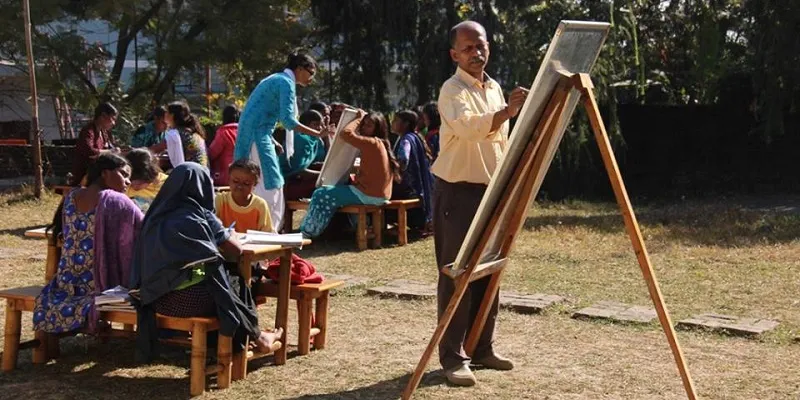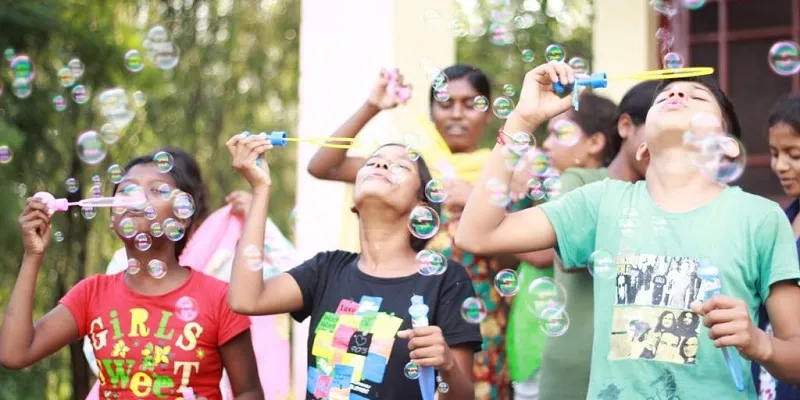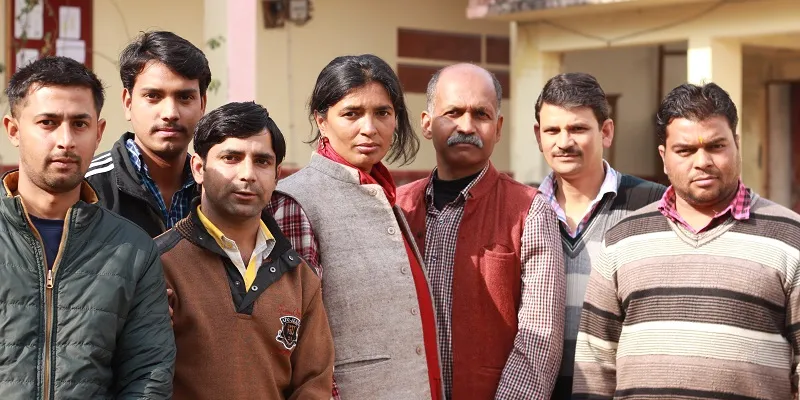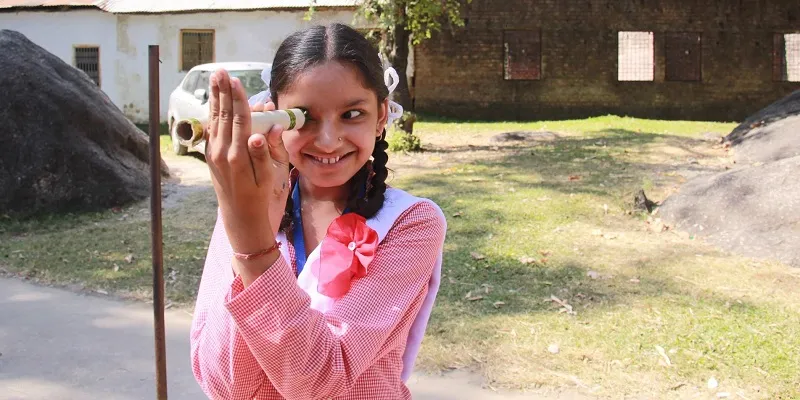Meet the couple that left US to make Science and Maths learning fun in remote Himachal Pradesh
How do you intervene in an education system that is driven by fear and rote learning? Well, rooted in a small village in Himachal Pradesh, Aavishkaar is empowering underprivileged children with creativity, curiosity, and critical thinking. Through its programmes centred on science, math, and art, the NGO is making learning a fun process.

Going back to one’s roots
Sandhya Gupta (50) and Sarit Sharma (52), both PhD's in Electrical Engineering, worked as research scientists in the USA for 15 years. However, in 2009, the couple decided to leave behind their nine-to-five work routine and do something more meaningful. "Living in Minneapolis, we had a long and fulfilling career. However, our society tends to keep engineers devoid of a sense of service towards the society. We decided to quit our jobs and move back to India," Sandhya tells us.
The couple chose to settle in Kandbari, a village situated seven kilometres from Palampur, nestled in the Dhauladhar range of the Western Himalayas. "We had no past connection with the place. But since we lived in a cold place in the US, we wanted to settle in some place similar," Sarit says.
Their daughter was over five years old and had to start school. As Sandhya and Sarit visited several schools in the region, they were disappointed by the culture of fear prevalent in schools in India. Sandhya says,
"Kids run away from their teachers. Students are intimidated to learn. We believe that there shouldn't be any fear associated with learning. Education should eliminate fear and not ratify it."
The couple realised that it was the government schools where children interacted and played with each other the most, although other issues remained. Sandhya and Sarit admitted their daughter in the local government school of the village, and also started visiting the school during the afternoons to interact with the children, read stories out to them, and help them learn in a more fun way.
Over the next four years, Sandhya and Sarit developed a deeper understanding of both primary and high school education. They firmly believed that science and maths are the primary vehicles of learning and critical thinking, and decided to formalise their ways. "Science helps you understand the world around, and math helps you formulate it. We enjoyed science and math. The challenge was to transfer the same interest among children," says Sandhya.
The couple came up with modules in basic science and maths concepts, such as air, light, sound, magnetism, heat, addition, subtraction, multiplication, equation, polynomials, among others. These modules were intended to make learning fun and experiment based. They started approaching schools and providing hands-on and experiential maths and science programmes for students from underprivileged backgrounds. In February 2014, Aavishkaar was officially born.

Making learning fun
Aavishkaar imparts learning through tangible and simple experiments, no matter how complex the theoretical concepts are. For example, instead of theoretically explaining the sum of the angles of a triangle is 180 degrees, a child is simply allowed to cut the vertices of triangles made from cardboard and align them to see how they make a straight line. Similarly, concepts of reflection are explained through mirrors and lenses placed in smoke-filled cardboard boxes, and passing laser lights through them. Apoorva Bhatia, a teacher who volunteers for the NGO tells us,
“We come across many students who were earlier considered shy, disinterested, or even dull but have suddenly started to shine. Once they have better context of their subject, and they can touch or feel a model or an experiment, they become much more confident.”
Apoorva, who is embarking on Jagriti Yatra this year, shares with us a disturbing experience of how rote learning is destroying creativity in schools. She tells us about her visit to a school where every child had written the same essay on the topic 'How did I spend my Sunday', only to realise later the essay was written by their teacher on the classroom blackboard, and students had simply copied it. “Schools don’t necessarily lack infrastructure. They lack teachers who have the desire to get creative in their approach. Most experiments we do in our schools don’t cost anything,” she adds.
Till date, Aavishkaar has organised science and maths fairs, workshops, and residential camps with over 10,000 children from over 30 schools. The NGO has organised 270 programmes and 13 residential camps so far. Aavishkaar has also organised five teacher training workshops so far, through which they are helping more teachers learn and implement their alternative methods of education. These modules are developed in both Hindi and English.

Empowering Dalit girls with scientific curiosity
Aavishkaar is also partnered with Patna-based organisation Nari Gunjan, which focusses on empowering Dalit girls and women through education. Many of the residential camps organised by Aavishkaar are in collaboration with Nari Gunjan, where these girls come and participate. Sandhya says,
“Most of these girls don’t go to schools, and the ones who do start dropping out from school by the time they reach the eighth grade. We train them with math and science concepts that are useful in daily lives. Also, they are the ones who’d be raising kids. So if we empower a woman through education, we are empowering a future family.”
After the basic concepts for these girls are cleared, Sandhya and Sarit, both being engineers, try to teach the important life skill of breaking down a problem in smaller steps, understand the boundary condition and limitations, devise a solution and finally build a prototype for it. These design challenges, which include building a chair with newspapers, or building a bridge prototype with a limited number of ice cream sticks are designed to help these girls learn teamwork and approach a problem more scientifically. The assessment of the challenges is also more realistic.
Sandhya explains how these camps help develop a culture of scientific inquiry. The courses are designed to enhance logical and critical reasoning. Very often, these children go back to their schools and share their learnings with their friends. “So the impact is actually in multiple folds,” Sandhya says. She also shares an experience where one of her students, after attending an Aavishkaar camp, went back to her school in Bihar, and had an interesting debate with her teacher.
“She had to go to the washroom, which she did without seeking permission from the teacher as we encouraged that at Aavishkaar. When her teacher scolded her for doing so, she responded by saying, ‘you were busy teaching an interesting concept and the students were interested. I didn’t want to disturb the class.’ Her teacher was speechless.”
Aside Nari Gunjan, Aavishkaar has also organised camps in partnership with other organisations, including Karam Marg, Kranti, Pushp Niketan, Saantvanaa, among others.

Future plans
For the next one year, Aavishkaar plans to build modules across different concepts for all classes up to 12. The NGO is also collaborating with the Himachal Pradesh government and Delhi government to help train more students and organise teacher training workshops.
In the longer term, Aavishkaar wants to build its own campus, and create a large team of educators who travel across the length and breadth of the country, making learning a fun and hands-on experience through scientific inquiry.







